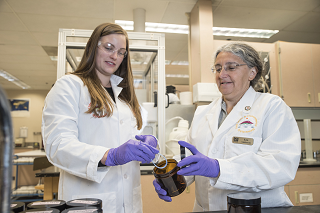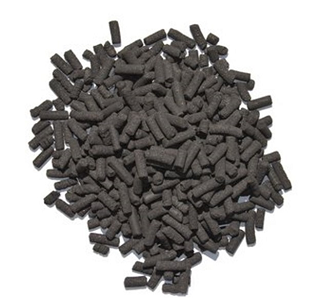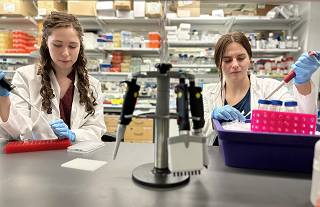Hot Off the Press
E-Factor Stories
New Report Calls for Expanding the Risk Assessment Toolbox : A new report released by the National Academies of Sciences, Engineering, and Medicine provides recommendations for implementing new approach methodologies in human health risk assessments. The committee that developed the report, which was sponsored by the U.S. Environmental Protection Agency, included several SRP grant recipients.
Studying DNA Damage and Repair Unlocks Key to Cancer Treatments : How the body repairs DNA damage following exposure to a chemical called N-nitrosodimethylamine can provide new insights for cancer treatment, according to Jennifer Kay, Ph.D. The former Massachusetts Institute of Technology SRP Center trainee presented her findings during the August 1 Wetterhahn Award Seminar.

Silicone Wristbands Track Hundreds of Unique Chemical Exposures : With funding from SRP and other NIEHS programs, researchers at the Oregon State University (OSU) SRP Center developed a simple, non-invasive approach to monitor personal chemical exposures using silicone wristbands.
Seven Trainees Awarded K.C. Donnelly Externships : NIEHS Superfund Research Program (SRP) trainees received award supplements to learn new methods and techniques at other SRP-funded institutions and government labs.
Grantees Report Progress to Decrease PFAS, Arsenic, Other Exposures : The recent Progress in Research webinar series highlighted the research of 11 SRP multi-project centers. Webinars included information on disaster-related exposure to hazardous chemicals, indigenous health, PFAS exposure, and birth outcomes as they relate to environmental exposures.

Nature-based Remediation Technologies Help Clean Up PCB Contamination : Polychlorinated biphenyls (PCBs) are associated with poor birth outcomes, cancer incidence, hormone disruption, and liver problems. Upal Ghosh, a University of Maryland, Baltimore County researcher, has developed activated carbon pellets that can uptake PCBs and prevent environmental exposures. Ghosh is also studying remediation options using bacteria to break down the PCBs that are bound to the carbon pellets into non-toxic forms.
Extramural Paper of the Month: Stricter Drinking Water Standards for Arsenic Benefit Highly Exposed Populations : A federal regulation lowering the amount of arsenic allowed in public water systems reduced arsenic exposure among communities across the U.S., found researchers at the Columbia University Northern Plains SRP Center.
Extramural Paper of the Month: Prenatal Benzene Exposure May Have Lifelong Metabolic Consequences : Exposure to benzene in the womb may predispose offspring to metabolic diseases later in life, according to a study in mice. The study, led by researchers at Wayne State University, was partly funded by SRP.
Extramural Paper of the Month: Key Gene Expression Changes in the Placenta May Predict Autism Diagnosis : Researchers at the University of North Carolina at Chapel Hill SRP Center identified key changes in placental gene expression that are associated with the development of autism spectrum disorder (ASD) in children born preterm.
Extramural Paper of the Month: PFAS Exposure May Interfere with Dieting Success : New research suggests that PFAS exposure is associated with weight management problems. The study, by the University of Rhode Island SRP Center, found that participants with the highest levels of five different PFAS compounds also had the highest weight retention after successfully losing at least 8% of their body weight prior to the study.
News Stories
Exposure to NDMA Causes Tell-Tale Mutational Pattern : N-nitrosodimethylamine (NDMA) was once used to make rocket fuel and is now associated with cancer incidence from contaminated drinking water. Researchers at the Massachusetts Institute of Technology SRP Center have identified a mutational pattern in DNA after exposure to NDMA that could be used as a signifier of cancer development. The discovery of this mutational pattern can improve detection of early cancer and improve prognoses.
Research Briefs
Modified Iron Particles Could Improve Bioremediation of PFAS : Iron particles coated in a nontoxic material may enhance PFAS degradation by a certain bacterium, according to SRP-funded researchers at Princeton University. The study could inform bioremediation efforts that harness the microbe, known as Acidimicrobium Strain A6, for cleaning up contaminated soil, sediments, and aquifers

Benzene Exposure During Pregnancy Affects Later-Life Metabolic Health : Prenatal exposure to the air pollutant benzene may lead to a higher risk of metabolic diseases later in life, according to a study in mice partially funded by SRP. Benzene affects neurodevelopment, predisposing offspring to harmful metabolic effects, found a research team led by Marianna Sadagurski, Ph.D., of the Wayne State University SRP Center.
Cadmium-Linked Inflammation Increases the Severity of Lung Infection : Fine particulate matter in air pollution often includes cadmium, a harmful heavy metal emitted from smelters and coal fired plants. Cadmium exposure has previously been linked with higher risk of lung disease and death from flu and bacterial pneumonia infections. Researchers funded in part by SRP uncovered a key mechanism explaining how inflammation caused by cadmium exposure makes lung infections more severe and deadly.
Exposure to PCBs During Nursing Leads to Temporary Diabetes-Related Health Effect : Polychlorinated biphenyl (PCB) exposure during infancy from their mother's milk is associated with short-term glucose intolerance. Mice pups nursed until they were three weeks old, with the PCB-exposed group experiencing higher rates of glucose intolerance than the control group. At week 12, there were no observed differences in the control or experimental group, indicating that the PCB-induced glucose intolerance was not a long-term nursing health effect.
Hot Publications
Check out our Hot Publications page to see brief summaries of papers that have been featured in the monthly e-Posted Notes newsletter!
to Top



